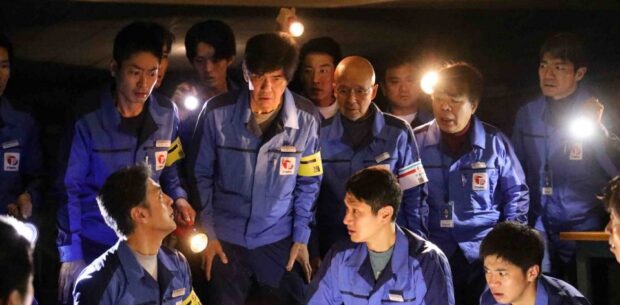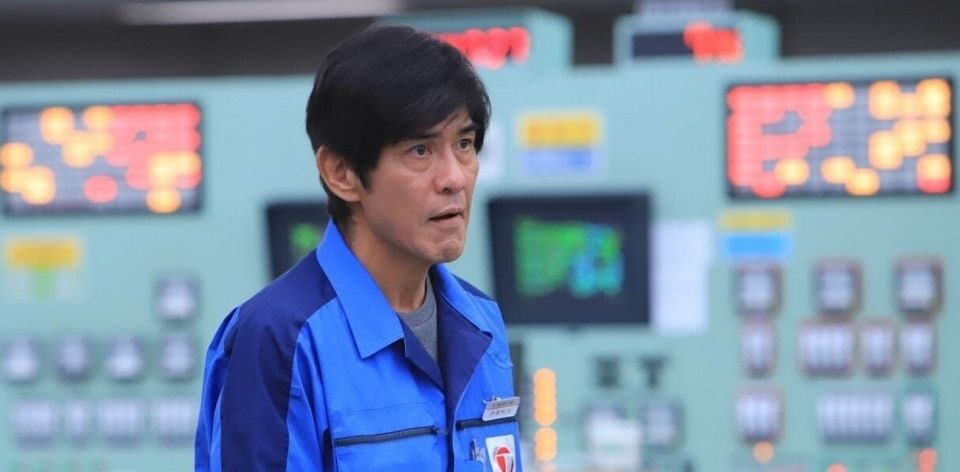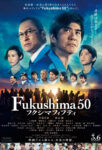Almost a decade after the devastating events of 11 March 2011 at Fukushima in Japan, the country is still feeling the economic, environmental and cultural impact of the disaster. There’s been any number of dramatic films that have spoken about those indirect impacts and several documentaries on the subject as well.
Based on Ryusho Kadota’s book On the Brink and directed by Setsuro Wakamatsu, FUKUSHIMA 50 (フクシマ50’) is the first ‘big’ budget film to directly tackle the event itself. Beginning at 2:46PM on the day and rolling straight into disaster, it doesn’t even wasting time explaining acronyms. It concentrates on five days on the job of the titular group of workers, given their name by the international media at the time, who stayed behind and tried to ensure the power plant was safe.
Here’s a film that comes with all the ticks of a modern disaster movie, or even a monster movie. Indeed, many compared it with Shin Godzilla‘s boardroom/worker focus at the time of release. As timestamps are writ large across the screen, we watch as the plucky group jimmies batteries out of their own car for power, form “suicide squads” and plunge headfirst into danger while the bureaucrats at HQ are still trying to work out what’s going on.

The central performances are fine, aiming for a humanisation of the collective group of workers at the heart of this story. Koichi Sato and Ken Watanabe are, of course, excellent. The CG effects are relatively restrained and quite impressive, especially the initial wave striking the coastline. That said, it’s hard to compete with those terrifying real-life images of trucks and people helplessly fleeing the tsunami almost ten years ago.
Which might be the biggest disappointment of FUKUSHIMA 50: the complete absence of any discussion of impacts beyond this microcosm. In the film’s world, disaster is ultimately averted, the heroes are the little guys (and briefly the American military), and the only fingers that need pointing are at that cruel mistress called Nature. Despite being almost a decade on, it doesn’t even touch on the longer term impacts.
Of course, there are many other films at this year’s JAPAN CUTS (and similar festivals) that cover these issues, including the erotic drama It Feels So Good. Wakamatsu and screenwriter Youichi Maekawa (known for adapted TV dramas like A Lone Scalpel) are purely interested in the moment to moment action, and on this level they achieve that tidily.
With the tenth anniversary of the disaster less than a year away, there will undoubtedly be more content coming from around the world. While this film may be an early attempt at setting the tone, it ironically ends on a reminder that the theme of the 2020 Tokyo Olympics is ‘reconstruction.’ With the current global pandemic halting that event as well, perhaps the truest line of the film is one of the last: “We believed we controlled nature. It was human ego.”
2020 | Japan| DIRECTOR: Setsuro Wakamatsu | WRITER: Youichi Maekawa (based on the non-fiction book by Ryusho Kadota)| CAST: Ken Watanabe, Koichi Sato, Hidetaka Yoshioka, Naoto Ogata, Takumi Saito, Narumi Yasuda | DISTRIBUTOR: JAPAN CUTS (US), Shochiku, Kadokawa Pictures (JPN) | RUNNING TIME: 122 minutes | RELEASE DATE: 17-30 July 2020 (JAPAN CUTS)






